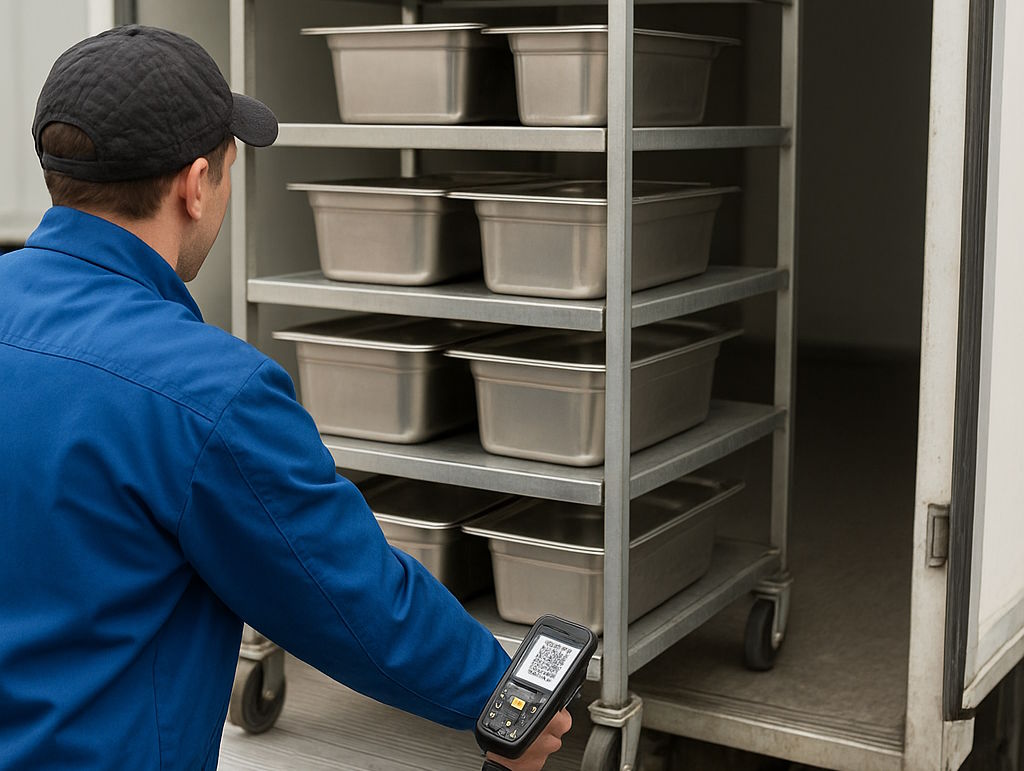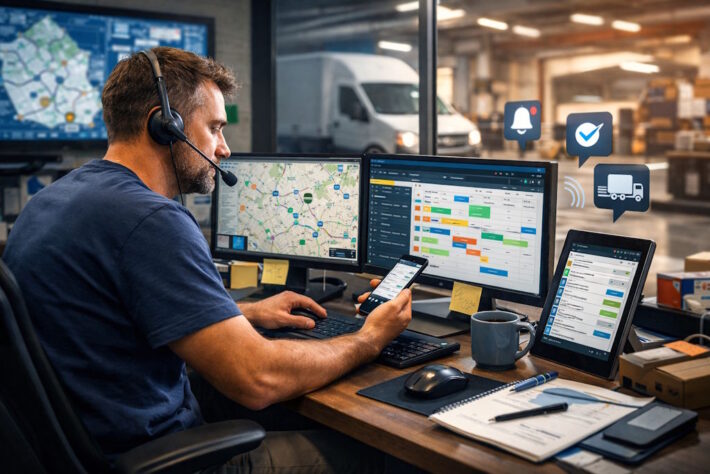Central kitchens and zero plastic: the hidden challenges of the 2025 revolution

Since January 1, 2025, a silent revolution has been transforming French central kitchens: the ban on plastic containers in school and university catering. Behind this environmental measure lie colossal logistical challenges that few had anticipated. Deep dive into the backstage of a transition that redefines the entire collective meal production chain.
A law that disrupts 20 years of habits
The fateful deadline has arrived
The EGalim law sets a deadline: January 1, 2025 (or 2028 for municipalities with less than 2,000 inhabitants) to definitively ban plastic containers for cooking, reheating and serving. This measure addresses a dual objective: environmental protection and public health, as plastic components are suspected of being endocrine disruptors.
However, 68% of carriers with fewer than 20 vehicles don’t seem to measure the scale of necessary transformations. Because beyond simply replacing containers, it’s the entire logistics ecosystem that must be rethought.
The sector’s brutal awakening
Since 2018, we knew that between 2018 and 2025 we had 7 years to get our act together, recalls an equipment manufacturer. Seven years that flew by quickly, leaving many players in urgent need.
“It’s not when you want you can, but rather when you can you want. You can’t change the practices of hundreds of thousands of canteen workers overnight,” warns Maxime Cordier, director of La Fontenaysienne.
Stainless steel takes over, but at what cost?
The comeback of a forgotten material
Stainless steel is making a big comeback in central kitchen considerations. Stainless steel gastronorm containers are massively replacing disposable plastic trays, but this transition proves more complex than anticipated.
Weight, the first challenge: The main disadvantage of washable containers is their weight – at least twenty times heavier. A major constraint that directly impacts working conditions and requires rethinking workstation ergonomics.
Emerging technical solutions
Faced with these challenges, manufacturers are innovating. RIEBER France has developed a specific range with lightened but reinforced containers, equipped with laser QR codes for traceability. These QR codes are generated by an automated and patented laser system that allows engraving stainless steel without modifying its structure.
Innovation doesn’t stop there: waterproof lids with silicone-free food-grade seals, conical shapes to facilitate stacking, customization in establishment colors… Everything is designed to facilitate this transition.
SIVU Bordeaux-Mérignac: a case study
23,500 daily meals in zero plastic mode
The Inter-municipal Single Purpose Union (SIVU) of Bordeaux-Mérignac perfectly embodies the challenges of this revolution. With more than 23,500 meals per day in 2024, this central kitchen is a pioneer in adapting to zero plastic.
The technical challenge: Abandoning plastic vacuum cooking in favor of traditional methods (oven, pots) while maintaining organoleptic quality. This transition, although complex, allows maintaining the organoleptic quality of cooked dishes.
Logistics rethought from A to Z
The transition is not limited to simply changing containers. The central kitchen must still implement new workflows, particularly for transport and storage of containers throughout the logistics chain.
SIVU’s strategic choices:
- Two formats selected: GN 1/2 format and GN 1/3 format
- 3,200 GN 1/2 containers and 1,500 GN 1/3 containers ordered in the first phase
- Automated packaging line with banding for traceability
Digital traceability, the nerve of war
A major security challenge
Strengthening the traceability system and transitioning to digital traceability remain a priority to guarantee food safety. In a context where each container must be tracked, cleaned, disinfected and reused, traceability becomes crucial.
SIVU Bordeaux-Mérignac chose to equip itself with a digital traceability system combining:
- QR codes laser-engraved on stainless steel containers
- Automatic banding to secure transport
- Digital tracking of each container in the reuse loop
Everest at the heart of logistics optimization
It’s in this context that Everest TMS intervenes as a logistics optimization solution. Our platform supports central kitchens in:
Container traceability: Precise tracking of each stainless steel container and lid throughout the circuit
Route optimization: Intelligent delivery planning taking into account the additional weight of reusable containers
Dispatch automation: Automated management of mission assignment according to specific constraints (weight, volume, equipment)
Unanticipated transition challenges
Impact on working conditions
A stainless steel or glass container is much more complex to handle than a plastic tray. Teams must adapt to heavier handling, sometimes requiring material handling assistance equipment.
Training and adaptation: Staff will need to adapt to new production methods on one hand and “endure” the extra weight of containers on the other. Crucial support for successful transition.
Repercussions on delivery logistics
The volume and weight processed will evolve and change the delivery equation. Vehicle fleets must be adapted, routes rethought to account for these new constraints.
Energy challenges: More weight transported = more fuel consumption. Paradoxically, this environmental measure may temporarily increase transport carbon footprint.
Architecture and investments: the great upheaval
Premises to be reinvented
Most kitchens in France have premises that are no longer suitable for non-disposable items. The architecture of central kitchens and satellite restaurants must be redesigned. An alarming observation that requires considerable investment.
New essential equipment:
- Industrial washing tunnels for containers
- Reinforced washing areas
- Storage spaces for clean and dirty containers
- Handling equipment adapted to weight
The cost of transition
Investments are colossal: purchasing stainless steel containers, reorganizing premises, staff training, vehicle adaptation… Reusable containers are expensive in terms of manpower, money, and impact health.
However, some kitchens like Fontenay-sous-Bois have been operating this way for almost 30 years, proving the model’s long-term viability.
Departmental Council 93: anticipating challenges
Sought-after expertise
The Seine-Saint-Denis Departmental Council (CD93) calls on our expertise to prepare its transition to zero plastic. With its multiple central kitchens serving colleges and social establishments, the stakes are high.
Our support covers:
- Audit of existing logistics flows
- Sizing needs for vehicles
- Optimization of delivery and collection circuits
Technological innovations that change the game
Traceability 4.0 and advanced systems
Some players like Microlide develop advanced central systems that simplify traceability for collective catering operators. A revolutionary approach that secures information and facilitates audits.
RFID and smart marking
Beyond QR codes, RFID technologies enable automated container tracking. From simple water-soluble labels to RFID marking for fully computerized container tracking, until its return to the kitchen.
Purchasing groups: mutualization as a solution
Strength in numbers
Faced with the scale of investments, communities are grouping together. The Tremplin purchasing group created specifically to find solutions to Egalim consequences illustrates this mutualization dynamic.
Benefits of cooperation:
- Negotiating preferential rates
- Equipment standardization
- Sharing experiences and best practices
- Mutualized research and development
Towards rethought collective catering
Beyond simple law compliance
This transition to more environmentally friendly packaging represents a major challenge, but also an opportunity to rethink practices. A chance to modernize a sector sometimes behind on innovation.
Emergence of new professions
Managing reusable containers creates new needs: reuse loop managers, digital traceability technicians, logistics flow optimizers… So many skills emerging with this revolution.
How Everest supports this transition
A comprehensive solution for logistics challenges
Faced with the complexity of this transition, Everest offers comprehensive support:
Advanced traceability module: Precise tracking of each container in the reuse loop with alerts for anomalies
Specialized route optimization: Algorithms accounting for new constraints (weight, volumes, handling times)
Container management interface: Dedicated dashboard to manage inventory, plan cleaning, optimize rotation
Environmental reporting: Measurement of CO2 impact and waste savings achieved
Native integration with existing systems
Our API enables smooth integration with central kitchen business software, avoiding breaks in established processes.
Key takeaways
The zero plastic revolution in 2025 radically transforms the central kitchen ecosystem. Beyond simply changing containers, the entire logistics chain must be rethought: premises architecture, staff training, delivery optimization and especially digital traceability.
Success key factors:
- Rigorous anticipation and planning of the transition
- Investment in traceability and optimization technology
- Training and support of operational teams
- Mutualization of resources through purchasing groups
Pioneers like SIVU Bordeaux-Mérignac prove that with the right tools and adequate support, this transition can become a modernization lever and service quality improvement.
In this zero plastic revolution, technology becomes the indispensable ally to transform regulatory constraint into innovation opportunity.



